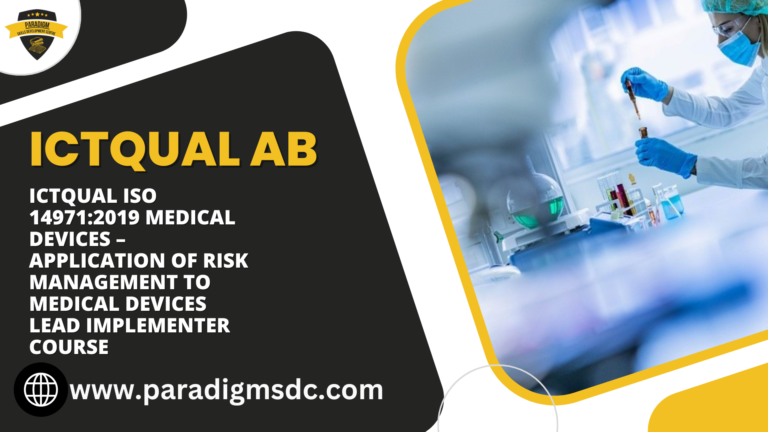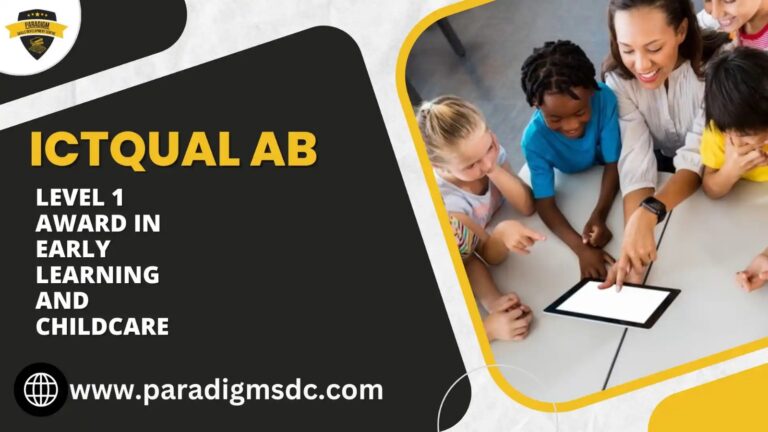Course Introduction
The ICTQual Level 4 Award in Understanding the Internal Quality Assurance of Assessment Processes and Practice is designed for individuals who are involved in or aspire to be involved in internal quality assurance (IQA) roles within their organizations. This qualification provides a solid foundation in the principles and practices of IQA, ensuring that assessments are conducted to the highest standards of quality and consistency. The course is ideal for those who want to develop a comprehensive understanding of IQA processes and enhance their professional skills in maintaining and improving assessment quality.
Course Overview
The ICTQual Level 4 Award in Understanding the Internal Quality Assurance of Assessment Processes and Practice offers a detailed exploration of the theoretical and practical aspects of IQA. The course is structured to provide participants with a thorough understanding of the roles and responsibilities of an IQA, the principles of quality assurance, and the methods used to monitor and evaluate assessment processes. Participants will learn how to ensure that assessments are fair, reliable, and valid, and how to support assessors in their professional development.
Course Study Units
- Understanding the Principles and Practices of Internally Assuring the Quality of Assessment
- Internally Assuring the Quality of Assessment
- Maintaining Legal and Good Practice Requirements When Internally Monitoring and Maintaining the Quality of Assessment
- Managing Information Relevant to the Internal Quality Assurance of Assessment
- Quality Improvement Strategies
- Communication and Collaboration
Learning Outcomes
By the end of this course, participants will be able to:
Understanding the Principles and Practices of Internally Assuring the Quality of Assessment
- Knowledge of Key Concepts: Demonstrate a clear understanding of key quality assurance concepts, including validity, reliability, standardization, and fairness.
- Role Identification: Explain the roles and responsibilities of internal quality assurance in the context of educational and training assessments.
- Quality Assurance Processes: Understand and articulate the various processes involved in internal quality assurance, such as planning, monitoring, and evaluating assessment practices.
- Application of Principles: Apply the principles of internal quality assurance to real-world assessment scenarios to ensure high standards are maintained.
2. Internally Assuring the Quality of Assessment
- Planning Quality Assurance Activities: Develop and implement plans for quality assurance activities, considering potential risks and mitigation strategies.
- Sampling and Monitoring Techniques: Use appropriate techniques for sampling and monitoring assessment activities to ensure they meet organizational and regulatory standards.
- Providing Feedback: Deliver constructive feedback to assessors and other stakeholders to support continuous improvement in assessment practices.
- Practical Application: Conduct internal quality assurance activities effectively in various assessment contexts.
3. Maintaining Legal and Good Practice Requirements When Internally Monitoring and Maintaining the Quality of Assessment
- Understanding Legal Frameworks: Identify and explain the legal requirements and regulations for assessment and quality assurance practices.
- Ethical Considerations: Understand and apply ethical principles in the context of internal quality assurance, including confidentiality, fairness, and transparency.
- Good Practice Guidelines: Implement good practice guidelines to maintain high assessment and quality assurance standards, including accurate documentation and record-keeping.
- Compliance Management: Ensure all assessment processes and practices comply with legal and regulatory requirements.
4. Managing Information Relevant to the Internal Quality Assurance of Assessment
- Information Management Systems: Understand the role and functionality of information management systems in supporting quality assurance activities.
- Data Security and Confidentiality: Apply best practices for ensuring the security and confidentiality of assessment-related data.
- Data Analysis and Reporting: Analyze assessment data to generate meaningful reports that support decision-making and continuous improvement.
- Efficient Record-Keeping: Maintain accurate and accessible records of assessment activities and quality assurance processes.
5. Quality Improvement Strategies
- Identifying Improvement Areas: Identify areas for improvement within the assessment processes and quality assurance practices.
- Developing Improvement Plans: Create and implement strategies and action plans for continuous assessment quality improvement.
- Evaluating Effectiveness: Monitor and evaluate the effectiveness of implemented quality improvement strategies.
- Sustaining Improvements: Establish systems and practices to ensure sustained improvements in the quality of assessments over time.
6. Communication and Collaboration
- Effective Communication: Develop and demonstrate effective communication skills with assessors, learners, and other stakeholders involved in the assessment process.
- Collaborative Working: Foster a collaborative working environment to enhance the quality assurance processes.
- Stakeholder Engagement: Engage effectively with stakeholders to gather feedback and incorporate their insights into quality assurance practices.
- Conflict Resolution: Manage and resolve conflicts that may arise during the quality assurance process professionally and constructively.
Course Benefits
- Enhanced IQA Skills: Develop the knowledge and skills required to ensure high standards in assessment processes.
- Career Advancement: Improve employability and career progression opportunities in education and vocational training.
- Professional Recognition: Achieve a recognized qualification that validates your expertise in internal quality assurance.
- Effective Feedback: Learn to provide feedback that supports assessors’ development and competence.
- Continuous Improvement: Contribute to the continuous improvement of assessment practices within your organization.
Who is this Course For?
This course is ideal for:
- Aspiring or current internal quality assurers (IQAs) looking to formalize their skills and knowledge with a recognized qualification.
- Assessors seeking to understand and implement effective IQA practices.
- Education and training professionals responsible for maintaining assessment quality.
- HR professionals and training managers involved in quality assurance.
- Anyone interested in understanding and implementing effective internal quality assurance practices.
Future Progression
Upon completing the ICTQual Level 4 Award in Understanding the Internal Quality Assurance of Assessment Processes and Practice, participants can further their career development by:
- Pursuing higher-level qualifications, such as the ICTQual Level 4 Certificate in Leading the Internal Quality Assurance of Assessment Processes and Practice.
- Gaining experience and seeking advanced roles in education and training, such as lead IQA or external quality assurer (EQA).
- Engaging in continuous professional development through workshops, seminars, and additional certifications.
- Exploring opportunities in related fields, such as educational consultancy, training and development, or quality management.
- Contributing to the development and implementation of quality assurance policies and practices within their organizations.
The ICTQual Level 4 Award in Understanding the Internal Quality Assurance of Assessment Processes and Practice provides a robust foundation for anyone looking to excel in the field of internal quality assurance. By mastering the skills and knowledge covered in this course, participants can ensure that their organization’s assessment processes meet the highest standards of quality, fairness, and consistency.







